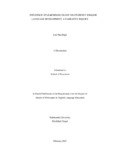
Please use this identifier to cite or link to this item:
https://hdl.handle.net/20.500.14301/517| Title: | Influence of Learning Ecology on Students’ English Language Development: A Narrative Inquiry |
| Authors: | Rijal, Lok Man |
| Citation: | Rijal, L.M. (2025). Influence of learning ecology on students’ english language development: A narrative inquiry.. |
| Issue Date: | Feb-2025 |
| Publisher: | Kathmandu University School of Education |
| School: | SOED |
| Department: | DOLE |
| Level: | M.Phil. |
| Program: | Master of Philosophy (MPhil) in English Language Education |
| Abstract: | This dissertation explores learning ecology and its influence on students’ classroom performance. It further explores the different dimensions of learning ecology and their effects on the performance of learners. School and classroom environments affect students’ learning and challenge the school leaders to create a conducive learning environment there. Similarly, home environments also influence students' learning equally. Parents’ educational awareness and effective involvement in creating an appropriate learning environment also impact a child's learning achievement. I applied Bronfenbrenner’sEcological System Theory to understand how it shapes students' learning outcomes, particularly his concept of micro, meso and macro-level ecological factors. I studied how the participants interacted in the inner school environmental components and outside environmental components and how their learning achievement was affected. With meaningful interactions and field experiences, I explored the different learning ecological dimensions. School-based and home-based learning dimensions have a greater influence on a child's classroom performance. School teachers, authorities, and parents must equally support raising a student's achievement level. Hence, Bronfenbrenner’s theory is relevant to this dissertation. I collected information about effective learning ecology from the stories of teacher educators and students’ classroom reflections. The information was codified and categorized, and themes were created. This study explores the influence of learning ecology on students' English language development, focusing on the lived experiences of students and teachers in the Nepali educational context. Through a narrative inquiry approach, the study captures the challenges faced by low-performing students. It highlights the impact of teaching methodologies, classroom practices, family environments, and societal norms on their academic progress. The findings reveal that creating an inclusive and supportive learning ecology rooted in mutual respect, cultural sensitivity, and tailored pedagogies can significantly enhance students' engagement and performance in English language classrooms. This research underscores the need for a paradigm shift in addressing low achievers, advocating for teacher adaptability and parental involvement to foster equitable educational opportunities. |
| URI: | https://hdl.handle.net/20.500.14301/517 |
| Appears in Collections: | Dissertation |
Files in This Item:
| File | Description | Size | Format | |
|---|---|---|---|---|
| Lok Man Rijal Dissertation_ Final 17 March 2025 voce (1).pdf | 2.33 MB | Adobe PDF |  View/Open |
Items in DSpace are protected by copyright, with all rights reserved, unless otherwise indicated.